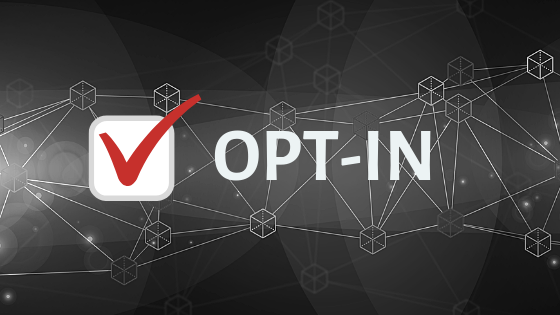While we are in desperate need of good quality education in the business community about what Blockchain is and what it can and cannot do — and a decent explanation as to how the world of consumer data is shifting — poorly researched articles like this, filled with inaccuracies and misleading statements, don’t do anyone any good.
Opt-Out vs. Opt-In: How Blockchain will Change the Data Collection Culture
Most of what is wrong with this article happens in these 3 sentences:
… the blockchain offers a different solution, a way to create a culture of “opting in.” One where consumers choose what to share and when to share it, rather than handing everything over to corporations and hoping it isn’t misused or lost.
Here’s how this shift from opt-out to opt-in will happen:
Here’s a pragmatic perspective:
- Blockchain does not offer anything. Blockchain as a tech stack can enable an environment where Opt-In is the focus. The change in business models and culture requires a lot more.
- Consumers a) Don’t have the time or the inclination to manage what they share and with which companies. They just want stuff to work. b) There are 3 types of data: Provided, Observed and Derived. Consumers are already careful about handing over things like name, address and birth date – the rest of the data is observed or derived, and companies and consumers have joint ownership of that data.
- The shift from opt-out to opt-in “might” happen. And so far as I can see the chance is tiny < 1% – not “will”.

And the collection and sale of users’ data … Another issue that desperately needs fixing is the actual business model of consumer data. Right now, consumers are the product. Their data is collected and sold, for the most part without their knowledge or explicit consent… Concepts such as the Brave Browser are already working on ways to keep advertisers in tune with consumers, while also creating an “opt-in” culture for users.
Just STOP it! Publishers do not (on the whole) sell users’ data. Data is their biggest asset. They use the data. They don’t sell it. Especially in the days of GDPR! Yes, multiple companies collect and use data for targeting without the users’ express consent, but that’s not selling of the data. As for the Brave browser, they are in effect monetising content that they don’t own by replacing publishers’ ads with their own. It doesn’t work (and it’s likely going to get them sued)! Lastly, we have yet to see any business model succeed where the premise is “We reward consumers for watching ads.” Those business models fall down because the audience willing to make that trade isn’t the one the advertiser wants to reach.

Interestingly, email marketers have been hit hard by the new regulations because marketers are no longer allowed to assume consent from customers. They now have to obtain permission from people on their mailing lists to continue sending emails. In effect, they have to encourage people to opt-in to receiving promotional emails.
Another poorly informed or written statement. Email marketers in the EU already need to collect consent to email on consumer (B2C) marketing. They *now* need to collect permission to “hold and process” data. The new regulation has nothing to do with permission to contact. That is already covered by the ePrivacy Directive and is being updated with the new PECR coming from the EU in 2020-2021. (The big change there is that B2B Emails may require opt-in permission – Game Changer!)
Storing content on a blockchain creates an immutable record of that content’s proof of existence.

Storing content “on” a blockchain is not a good use of Blockchain. What you want to store on the blockchain is the location of the content, the digital fingerprints of the content and keys/payments for content. People who think they should store 9TB of Game of Thrones videos on a blockchain are un/under-informed.
Bottom Line
Blockchain doesn’t make any difference in Opt-In vs. Opt-Out at all. There are some potential regulatory changes coming that may impact email marketers and others and some of them may use Blockchain to implement a compliant strategy.
Take TRAI (Telecom Regulatory Authority India) for example. They are mandating that all mobile operators, device manufacturers and marketers use a single blockchain platform where consumers’ opt-in/opt-out permission is registered in relation to telemarketing and SMS marketing. The users’ data isn’t stored on this blockchain – only their permission. It’s a great first step. Now that is where Blockchain is being used to support a government mandate of opt-in compliance.

